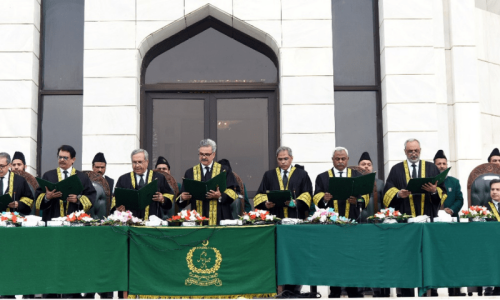ISLAMABAD: The fate of the Saarc summit, scheduled to be held in Pakistan in October, appears to be hanging in the balance, with Islamabad making it clear that it can take place only if ‘artificial obstacles’ placed in its way are removed.
“Pakistan considers Saarc an important organisation for enhancing regional cooperation. As we have ascertained earlier, whenever artificial obstacles created in the way of Saarc summit are removed, we will be happy to host,” Foreign Office spokesman Zahid Hafeez Chaudhry told a press briefing on Friday. He was asked if Indian Prime Minister Narendra Modi would be coming to Pakistan to attend the summit.
Answering a volley of questions about the countries persuading Pakistan to hold direct talks with India, he said Delhi had vitiated the atmosphere, and the onus was on India now to create an enabling and conducive environment for talks between the two countries.
He said Pakistan had never shied away from talks with India and it had always stressed the need of a ‘meaningful dialogue’ and peaceful resolution of all outstanding disputes, including the Jammu and Kashmir dispute.
“We believe that durable peace, security and development in the region hinge on peaceful resolution of the long-standing Jammu and Kashmir dispute,” the spokesman said.
When asked if behind-the-scene talks between the two countries were going on, he said: “States have their ways and means to communicate which remain available even during wars. Therefore, whether any talks are taking place between India and Pakistan is not important. What is important is: one, whether Pakistan should talk to India; two, what should be discussed between the two sides; and three, what constitutes conducive environment for a meaningful and result-oriented dialogue”.
He said no decision had yet been taken by the two countries to reinstate each other’s High Commissioner.
About the role of third parties including the US, the spokesman stressed that the international community had an important role to play in averting risks to peace and stability in the region and facilitating a just and lasting resolution of the Jammu & Kashmir dispute in accordance with UN Security Council resolutions.
In reply to a question about Pakistani prisoners languishing in Indian jails, he said these issues were taken up on a regular basis with the Indian side through an established mechanism that is in place between the two countries. “We continue to underscore the need for a humanitarian approach in handling the prisoners’ issues,” he said.
He downplayed the controversy over denial of landing permission at Kabul airport to a parliamentary delegation plane from Pakistan, led by National Assembly Speaker Asad Qaisar, and claimed that the visit of the parliamentary delegation to Afghanistan was postponed as the airport was closed due to security threat. He claimed the new dates for the visit would be announced after consultations.
“Pakistan enjoys close and cooperative relations with Afghanistan. The subject visit by the Speaker of the National Assembly of Pakistan was taking place at the invitation of his Afghan counterpart,” he said.
In reply to another question, he said the Afghan peace process had made significant progress last year. “We believe that it is critical that the progress made in the peace process is maintained and further built upon to achieve its stated objectives for a peaceful political settlement in Afghanistan. All parties must work together for an inclusive, broad-based and comprehensive political settlement,” he said.
Published in Dawn, April 10th, 2021
















































